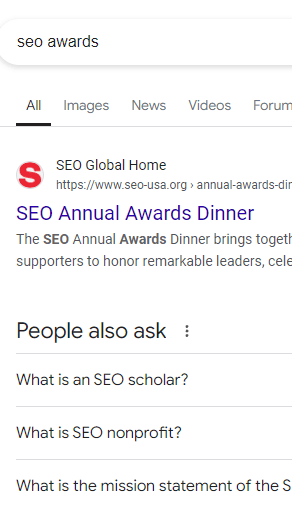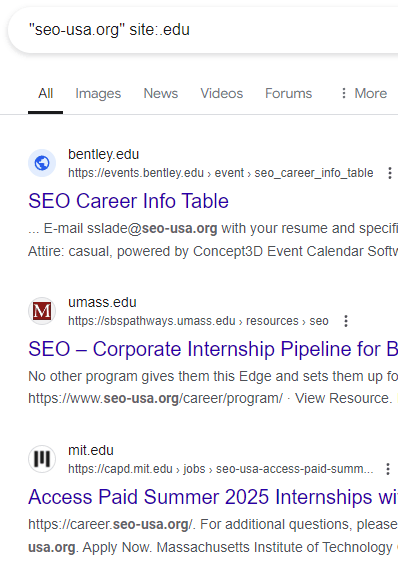

Last updated on

People frequently gripe about Google’s search results, but the phenomenon surrounding search outcomes for queries containing the acronym “SEO” is in a league of its own; witnessing it is necessary to comprehend its magnitude.
An anomaly is a departure from the usual or anticipated. Often, when there’s a glitch in the search engine results pages (SERPs), the anomaly can be rationalized. For instance, queries blending a geographic component with a longer, more specific phrase often yield peculiar outcomes. Another factor behind odd search results is insufficient data for a particular word combination, occasionally resulting in offensive search results.
However, the peculiar behavior observed with a specific set of keyword phrases related to the term “SEO” doesn’t fit into any of these categories of anomalies. It’s a genuine anomaly.
Here are the keywords where Google’s accuracy might be debated:
The website ranking for all those SEO search queries, and potentially more, is SEO-USA.org. However, the acronym “SEO” on this site stands for Sponsors for Educational Opportunity. It’s not a spam site; rather, it’s a legitimate non-profit organization established in 1963. The primary aim of this non-profit is to offer mentorship to underserved youth, aiding them in gaining access to colleges and universities. This initiative evolved into SEO Scholars, an eight-year academic program designed to support talented young individuals throughout high school and college.
“SEO Scholars is dedicated to fostering a more equitable society by bridging the academic opportunity gap for driven young individuals. It sets the benchmark for academic excellence, mentorship, community engagement, peer-to-peer support, and the cultivation of a robust, lifelong network.”
The acronym “SEO” holds significant relevance within the realm of online marketing. When conducting a search for “SEO” on Google, the suggestions provided are all pertinent to SEO in the context of search marketing.
Google Trends indicates that the phrases “SEO Scholars” and “SEO Scholars Application” are not widely searched in the United States; however, most of the searches originate from New York. Interestingly, SEO-USA.org maintains a top ranking for the group of keywords listed above in regions outside of New York.

It seems clear that SEO-USA.org isn’t pertinent to the typical interpretation of the acronym SEO.
The high rankings of SEO-USA.org for various phrases could be attributed to backlinks. A search limited to .edu sites reveals nearly seventy such sites linking to or mentioning SEO-USA.org. This advanced search, “seo-usa.org” site:.edu”, illustrates numerous .edu sites associated with SEO-USA.org.

The prevalence of high-quality sites with .org domains linking to SEO-USA.org is also notable, as evident in the advanced search: “seo-usa.org” site:.org -site:seo-usa.org”. While it may initially seem that backlinks are solely responsible for SEO-USA.org’s rankings for unrelated keywords, the situation might be more complex than it appears. There could be additional factors at play that contribute to this phenomenon.
If the presence of links were the sole determinant of SEO-USA.org’s rankings, one would expect that nearly every keyword phrase associated with SEO would predominantly feature .edu and .org websites. However, this is not the reality.
Having worked in SEO for approximately 25 years, I can recall a time when websites with the highest PageRank would effortlessly rank for a wide array of search queries. Back then, .edu links were highly esteemed for their potency in helping sites achieve favorable rankings.
As Google’s algorithms evolved, the significance of .edu links began to diminish as the contextual relevance of a link became increasingly important. The words within the title element and the surrounding text began to exert more influence on the impact of links. My own experiences in the field corroborate this shift.
Another significant adjustment in Google’s link ranking algorithms was the attenuation of the impact of link quantity. Previously, an inundation of links could propel a site to prominence, often surpassing more authoritative counterparts. My own experience attests to this era.
However, the influence of a vast number of links underwent several transformations. For instance, numerous links from a single domain ceased to be counted individually and were instead treated as a singular entity. Additionally, the placement of a link within a page gained greater significance. These adjustments collectively diminished the potency of links, rendering the sheer quantity less consequential for rankings.
Given these changes, I harbor some skepticism regarding whether links alone account for the rankings of SEO-USA.org.
There seems to be a missing relevance factor at play, enabling the (arguably) irrelevant SEO-USA.org site to rank for keywords it likely shouldn’t.
This anomaly suggests a potential clue as to why the site is achieving rankings where it doesn’t quite belong. It’s as if something essential is absent, which would typically act as a barrier to prevent its inclusion.
It’s plausible that trustworthiness could be a contributing factor in allowing the site to slip through the cracks, although this remains speculative. Do you have any alternative insights or ideas on this matter?
Original news from SearchEngineJournal